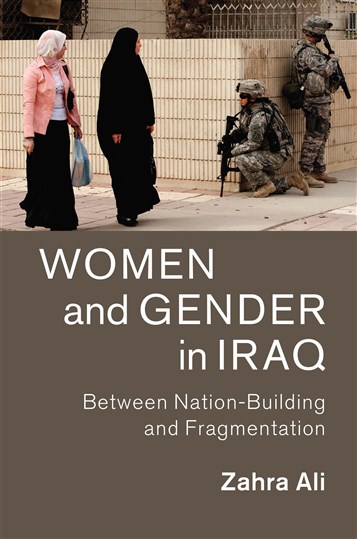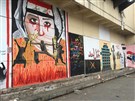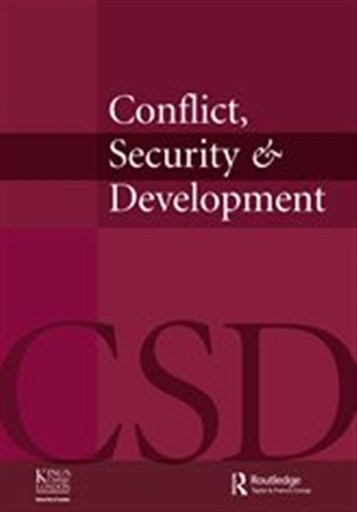Zahra Ali, Women and Gender in Iraq: Between Nation-Building and Fragmentation (Cambridge University Press, 2018).
Jadaliyya (J): What made you write this book?
Zahra Ali (ZA): I wrote this book to shed light on the rich and unique social history of feminisms in Iraq as well as on Iraqi women’s original social, economic, intellectual, and political trajectories since the formation of the modern Iraqi state in the 1920s. I also wrote it to explain and analyze the mechanisms that led Iraq to be the hypermilitarized ethnosectarian fragmented country it is today and the centrality of women and gender issues in these processes.
I am a sociologist, a feminist, and a daughter of a family of Iraqi political exiles in France. I started with an observation regarding the realities of knowledge production regarding Iraq: First, the literature on the country has a predominant “white man political scientist” approach that focuses on political regimes and leaders, offering a limited and limiting analysis; recent research even makes it sound like everything started (or ended) in 2003. In contrast, my book offers a wider historical perspective beginning with the formation of the modern Iraqi state. Secondly, the scholarship of Iraqi diasporic intellectuals is often authored by the older generation and not always updated, especially in relation to the social dynamics existing inside the country. This is why conducting sociological research based on in-depth ethnographic fieldwork is so central in my book. I spent a lot of time throughout a period of two years inside the women’s movement, mainly in Baghdad but also in Erbil and Sulaymaniyah in Iraqi Kurdistan. More recently, I expanded my research to Najaf-Kufa, Karbala, and Nasriya. Thirdly, in terms of what is produced inside Iraq regarding its social, economic, and political history, relational/intersectional works and gender and feminist perspectives are clearly lacking. This book proposes a complex, nuanced, and multilayered understanding of Iraqi society with a strong historical perspective. I engage in an ethnographic approach with a very detailed research focus on Iraq’s social, economic, intellectual, and political histories.
Through my participant observation with Iraqi women activists, we discussed and debated the current burning issues that mobilize women activists and the civil society in Iraq today...
J: What particular topics, issues, and literatures does the book address?
ZA: This book is a sociological study of Iraqi women’s social and political activism and feminisms through an in-depth ethnography of Iraqi women’s rights organizations and a detailed research on Iraqi women’s social, economic, and political experiences since the formation of the Iraqi state. Every single interview with female social and political activists (all between the age of twenty-one to seventy-four years old and from across the ethnic, religious, sectarian, and political spectrum) began with this question: Shenu eli khalash atkunin nashita neswiyya (What made you become a women’s right/feminist activist?). From the hours of conversation aroused by this question, I have gathered a transgenerational oral history of women’s social, economic, intellectual, and political lives since the 1950s. Through my participant observation with Iraqi women activists, we discussed and debated the current burning issues that mobilize women activists and the civil society in Iraq today, issues ranging from the Personal Status Code, ethnosectarian and political violence, as well as the militarization of the society. We also engaged in long conversations on the ways to define and experience social justice, gender equality, emancipation, and liberation.
My theoretical approach engages with transnational and postcolonial feminist literature, with a focus on the imbrication between issues of gender, nation, state, and religion. I look at the ways in which gender norms and practices, Iraqi feminist discourses, and activisms are shaped and developed through state politics, competing nationalisms, and religious, tribal, and sectarian dynamics, as well as wars and economic sanctions. I specifically look at the context following the US-led invasion and occupation and analyse the realities of Iraqi women’s lives, political activism, and feminisms, especially the challenges posed by sectarianism and militarism.
This book is as much about women, gender, and feminisms in Iraq as it is a feminist book about Iraq. As such, it seeks to contribute to critical feminist debates as well as to propose a feminist analysis of Iraq’s contemporary social, economic, and political history. It also enriches literature on gender(s), modern state(s), authoritarianism(s), nationalism(s), tribalism(s), religion(s), and social and political movements such as communism(s) and Islamism(s) in the Middle East as well as elsewhere in the world.
J: How does this book connect to and/or depart from your previous work?
ZA: I recently edited a journal volume entitled Decolonial Pluriversalism (in French Pluriversalisme Décolonial, co-authored with Professor Sonia Dayan-Herzbrun, Kimé, 2017) which explores decolonial theories reflecting on non-Eurocentric epistemologies, aesthetics, political thoughts, and activisms. The volume draws on Latin American and Caribbean philosophies, concepts of creolization and racialization, and explores Afropean aesthetics, arts and cultural productions, religion, feminisms, fashion, education, and architecture.
Before that, I published another edited volume, Islamic Feminisms (in French Féminismes Islamiques, La Fabrique, 2012; translated and published in German, Passagen Verlag, 2014) that reflects on transnational Islamic/Muslim feminisms through a postcolonial and intersectional feminist perspective, analyzing the interrelationship between race, gender, religion, and postcoloniality. This book also drew on my ethnographic research within the anti-racist and Muslim feminists’ networks in France in which I was involved.
This book challenges some of my early theoretical perspectives, not only in adding complexity but more importantly in terms of contexts. Postcolonial and decolonial perspectives have emerged mostly in the field of literature and cultural studies, and as a result tend to focus on discursive dimensions rather than on the social and economic realities that structure them. Also, it is easy to be stuck in the West/Orient paradigm while trying to dismantle it. The book describes and analyses concrete forms of imperialism, colonial, and neocolonial domination, but more importantly, it offers a complex analysis of Iraqi women’s struggles for emancipation, equality, and justice. In this book, I am applying the “personal is political” feminist mantra not only in looking at what Iraqi social and political activists say or think but at the very concrete social, economic, and political contexts that shape their discourse and activism.
J: Who do you hope will read this book, and what sort of impact would you like it to have?
ZA: My first audience is the Iraqi feminist activists with whom I spent time and from whom I learned so much throughout this research process. This book is for them and for the Iraqi civil, intellectual, and political society first and foremost. Its publication in Arabic is on its way. Then, I hope that feminist, anti-war, anti-imperialist, anti-racist, leftist, decolonial, and social justice activists and networks anywhere in the world will want to read this book. As I live in the United States at the moment, I wish many Americans will read it, because Iraq, just like Vietnam, is present in the everyday life of this country, in its prison industrial complex, in its normalization of the military industry, in police violence, in anti-black and anti-immigration racism, and in its neocolonial white feminism and so many other aspects of its social, economic, and political life. In this sense, I wish many people in the United Kingdom will read it too as their governments have also been deeply involved in the invasion and occupation. I also wish it will be read by individuals and students studying the Arab region, the Middle East, feminisms, and gender.
J: What other projects are you working on now?
ZA: At the moment, I am working on two main projects, both focusing on the context following the Islamic State invasion of Iraq in 2014: the first is part of the project “Religion and the Framing of Gender Violence” supervised by Lila Abu-Lughod, Rema Hammami, Janet Jakobsen, and Nadera Shalhoub-Kevorkian at the Centre for the Study of Social Difference at Columbia University. It is a critical reflection on gender-based violence initiatives and campaigns in relation to the “War on Terror” narrative and politics inside Iraq. The second is part of the SSRC Conflict Research Programme based at the Middle East Centre at LSE; it is a sociological exploration of youth, grassroots and diverse forms of social and civil society activisms in Iraq. Through an in-depth analysis of the political economy of militarism and ethnosectarianism, I explore the articulation between different forms of structural violence, senses of belongings, and diverse discourses and concrete practices of political and social activisms.
[Press Here for the Arabic version]

















